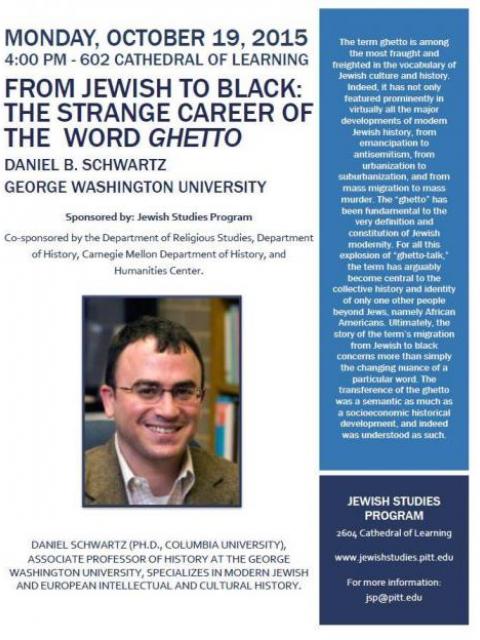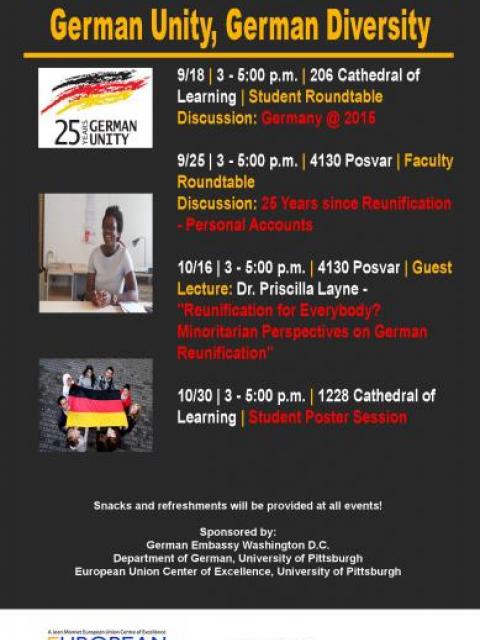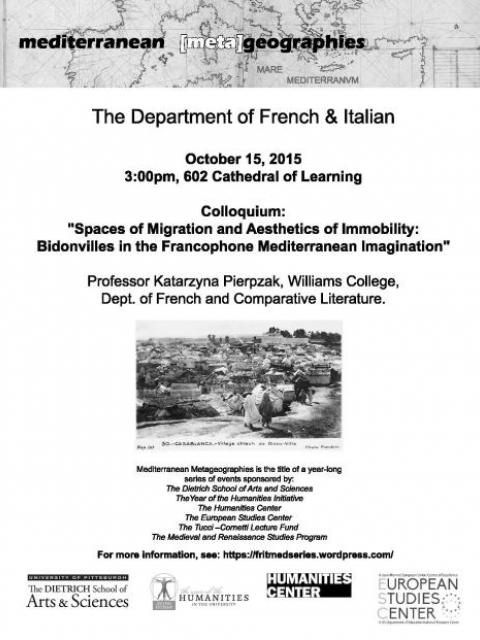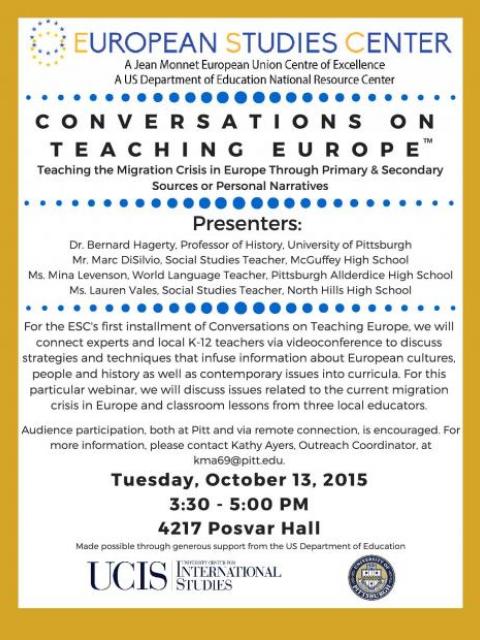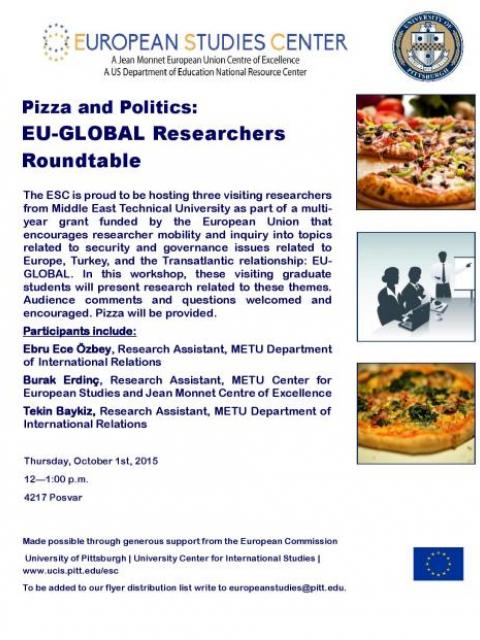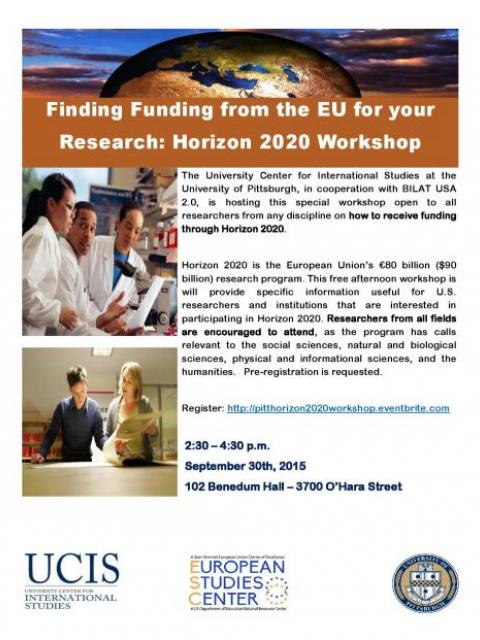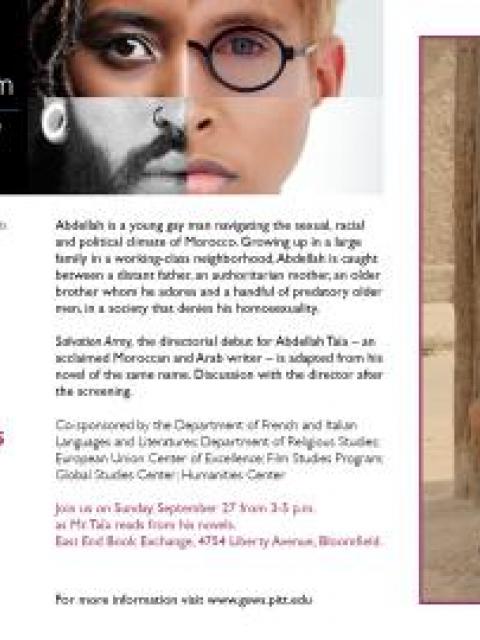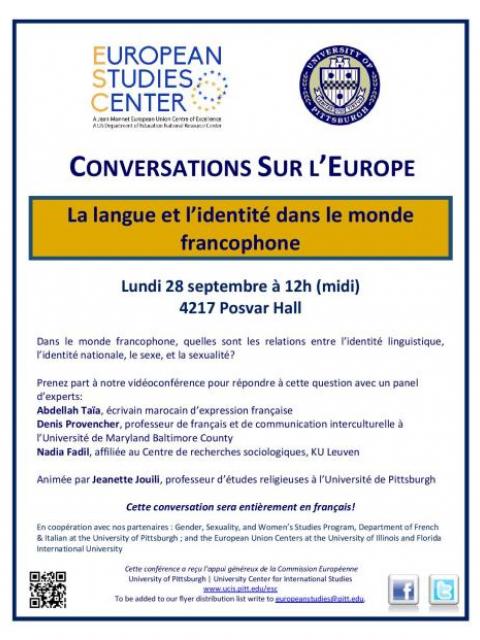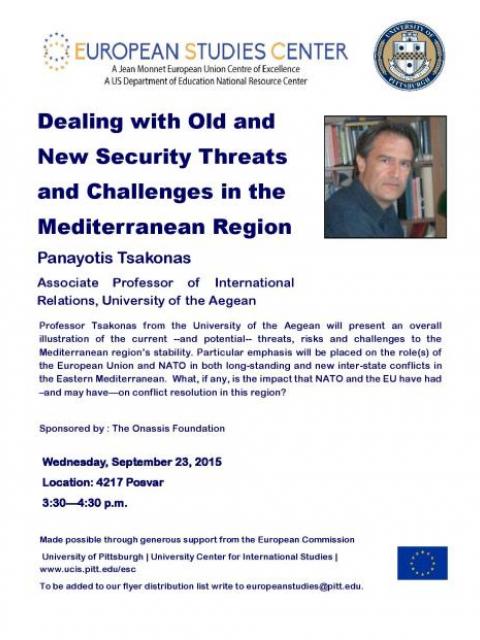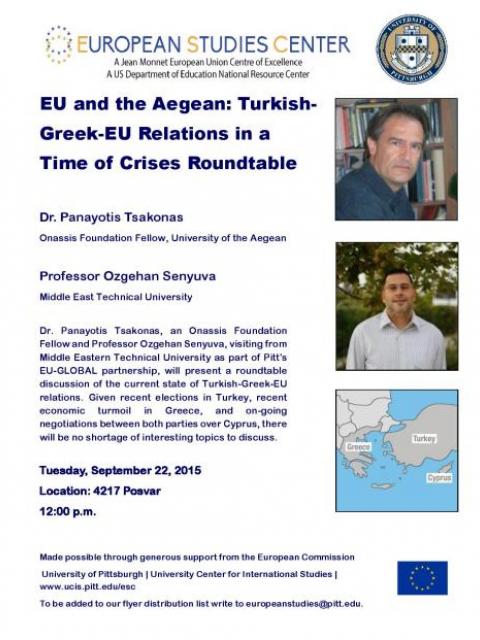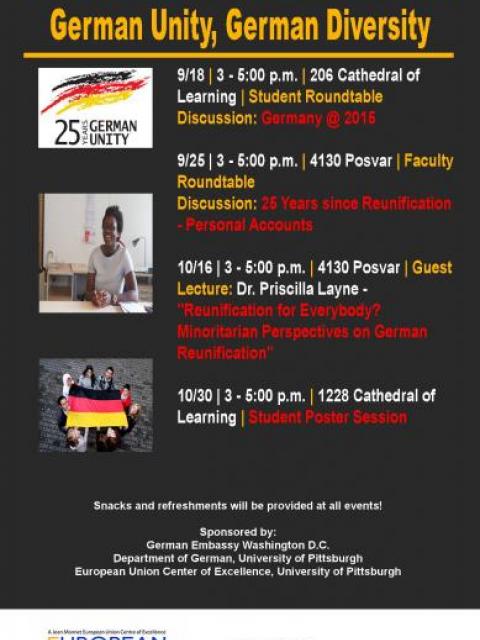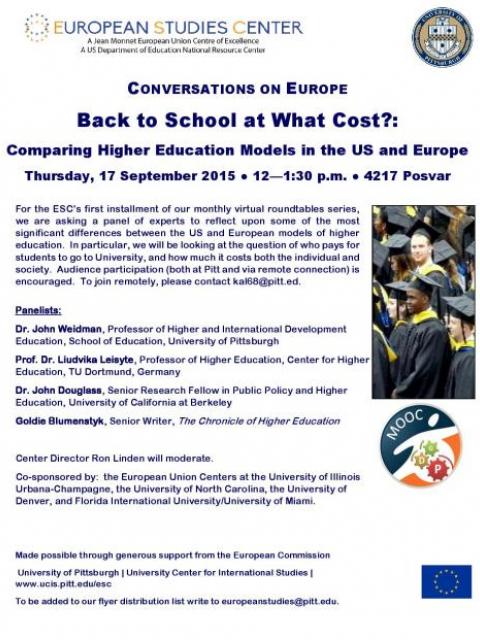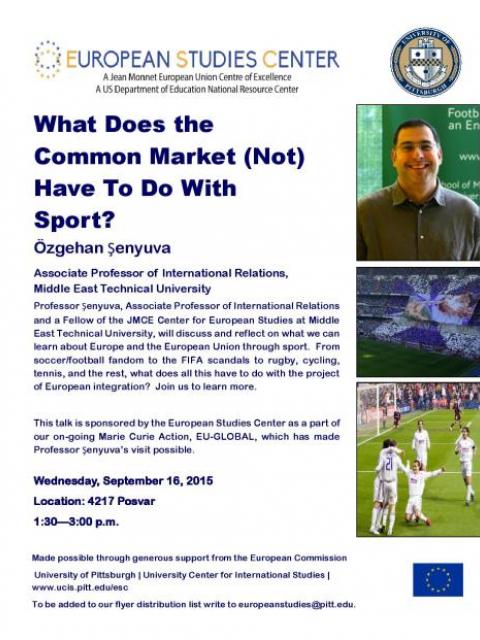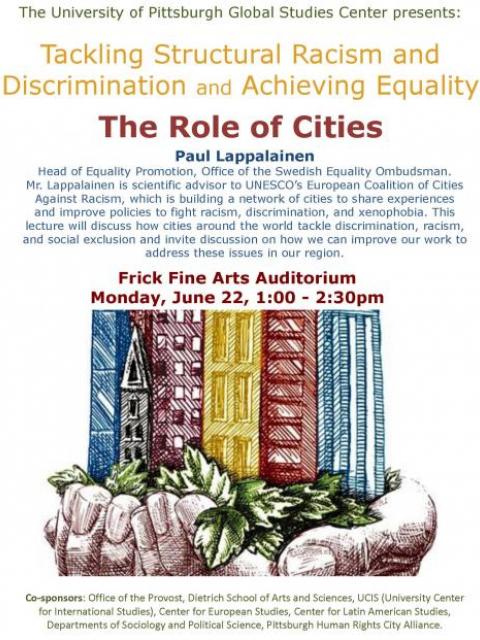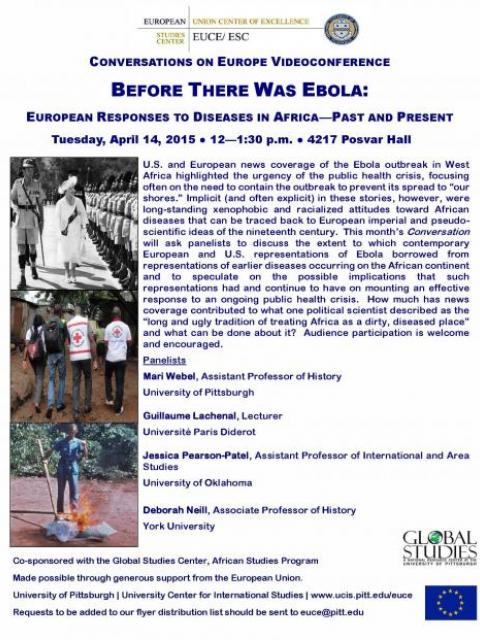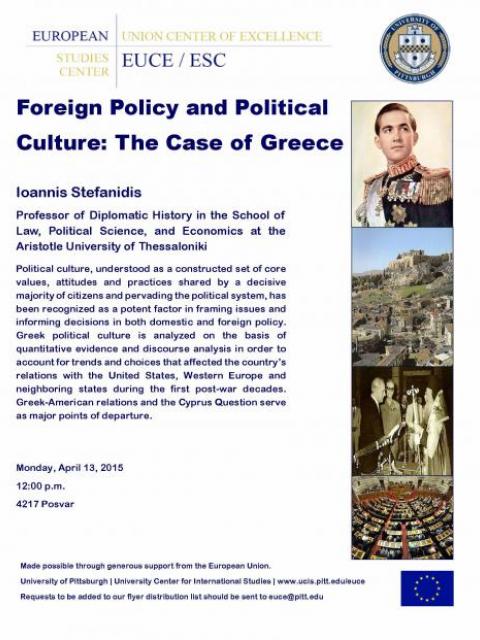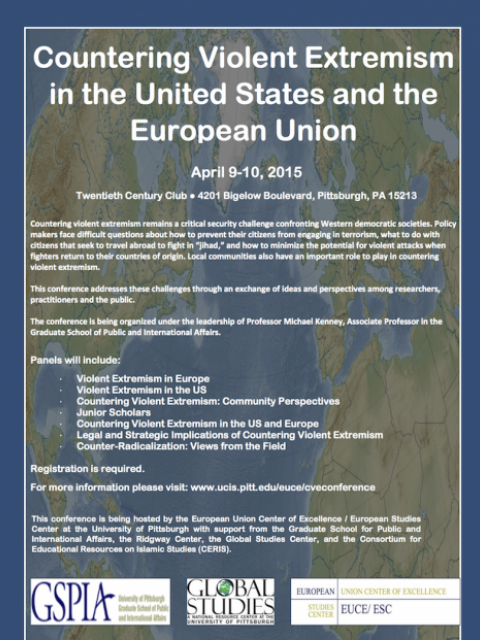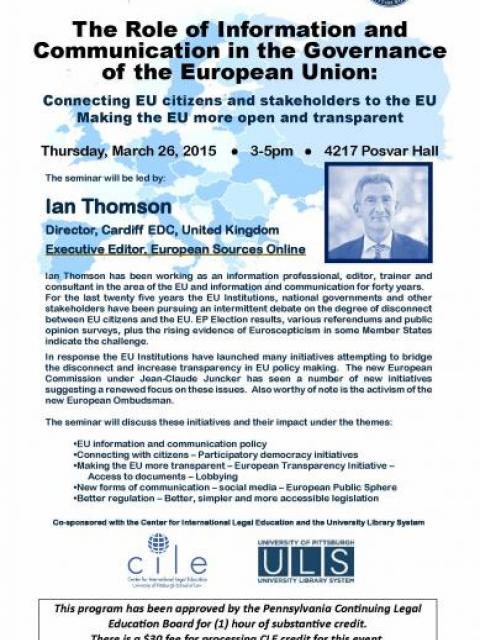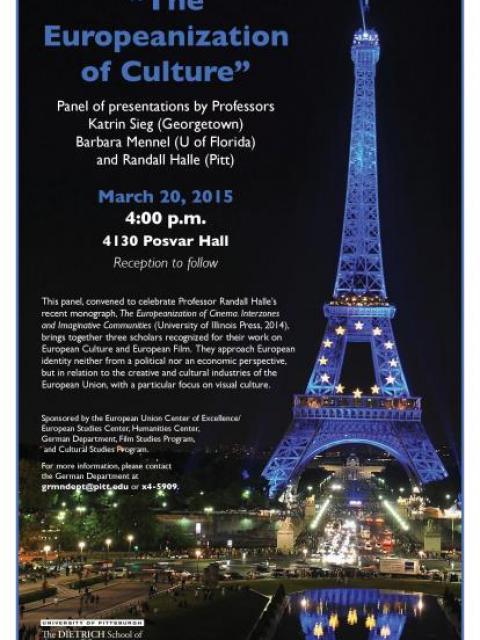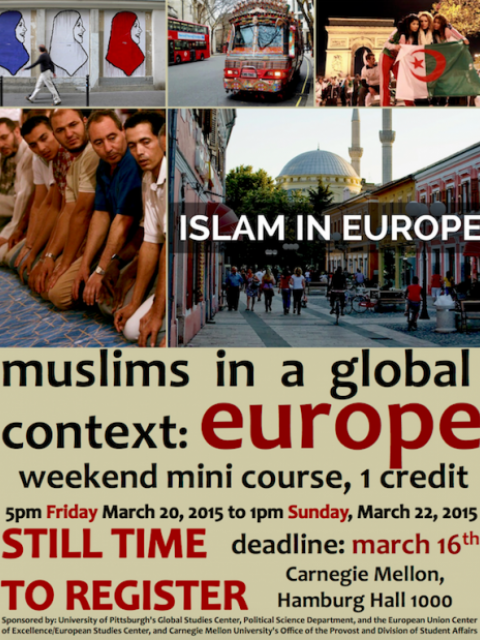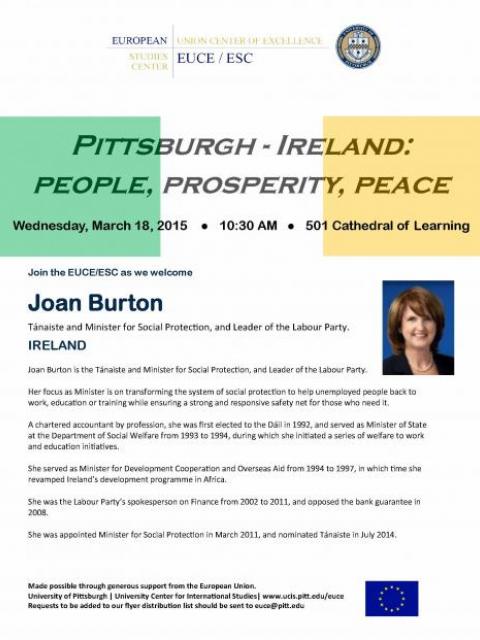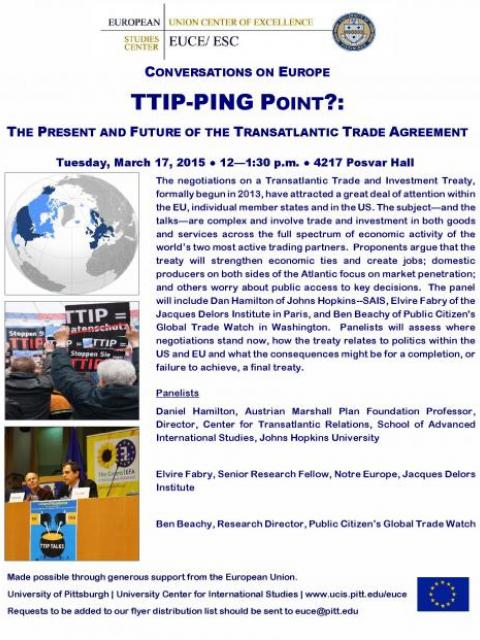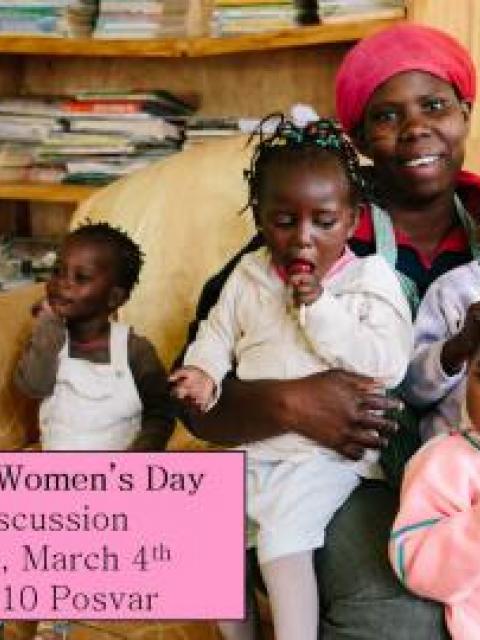Monday, October 19th, 2015
From Jewish to Black: The Strange Career of the Word Ghetto
Presenter: Daniel B. Schwartz, George Washington University
Location: 602 Cathedral of Learning
Announced by:
on behalf of
The term ghetto is among the most fraught and freighted in the vocabulary of Jewish culture and history. Indeed, it has not only featured prominently in virtually all the major developments of modern Jewish history, from emancipation to antisemitism, from urbanization to suburbanization, and from mass migration to mass murder. The "ghetto" has been fundamental to very definition and constitution of Jewish modernity. For all this explosion of "ghetto-talk," the term has arguably become central to the collective history and identity of only one other people beyond Jews, namely African Americans. Ultimately, the story of the term's migration from Jewish to black concerns more than simply the changing nuance of a particular word. The transference of the ghetto was a semantic as much as a socioeconomic historical development, and indeed was understood as such.
Sponsored by: Jewish Studies Program
Co-sponsored by the Department of Religious Studies, Department of History, Carnegie Mellon Department of History, and Humanities Center.
For more information, contact, jsp@pitt.edu
Friday, October 16th, 2015
Reunification for Everybody? Minoritarian Perspectives on German Reunification
Presenter: Dr. Priscilla Layne, Assistant Professor of German, University of North Carolina
Location: 4130 Posvar Hall
Dr. Pricilla Layne is the co-editor of the book Rebellion and Revolution: Defiance in German Language, History, and Art (2010). In this talk, she will take a look back at German reunification and consider its effects on minorities. How did minoritarian Germans feel excluded from the celebrations? How were minorities used to incite public fears? How did minoritarian artists respond to the physical and epistemic violence? And how has the notion of a German identity become more inclusive twenty-five years later?
Thursday, October 15th, 2015
“Spaces of Migration and Aesthetics of Mobility: Bidonvilles in the Francophone Mediterranean Imagination”
Presenter: Professor Katarzyna Pierpzak, Department of French and Comparative Literature, Williams College
Location: 602 Cathedral of Learning
The French term, bidonville, used throughout the Francophone Mediterranean to designate informal settlements and shantytowns, originated in Casablanca in the 1920s when migrant laborers set up encampments around the Carlotti and Central Quarries. From the very outset, the term referenced the materials of large-scale industrial production and its accompanying conditions of clandestine labor and migration. In this presentation, Pieprzak will explore both the history and imagination of these spaces of migration – from the writings of French colonial-era urban planners, to Fanon’s political theory of revolution, to contemporary Moroccan
literature that has turned its gaze on the bidonville as a contemporary condition of poverty. Drawing on theoretical work on “perceptual enclosure” (Sekyi-Otu) and “conditions of appearance” (Gordon), Pieprzak seeks to understand how an aesthetics of immobility has emerged in response to the dynamics of movement, crossing and ambivalence present in ordinary neighborhood life, and the role this aesthetics plays in the articulation of possibilities of self-constitution, self-revision and political agency.
This presentation is part of Mediterranean Metageographies, a series of events in AY 2015-2016 organized around the French and Italian Department’s fall (Mediterranean Studies) and spring (Sicily: How To Do Things With Islands) graduate seminars. For a full description of the events planned, please see the “About” tab of the series website: https://fritmedseries.wordpress.com/about.
Tuesday, October 13th, 2015
Conversations on Teaching Europe
Teaching the Migrant Crisis in Europe Through Primary & Secondary Sources or Personal Narratives
Location: Posvar Hall 4217
You are invited to join us for the European Studies Center’s first Conversations on Teaching Europe webinar on Tuesday, October 13th from 3:30 – 5:00 PM EDT.
For the ESC's first installment of Conversations on Teaching Europe, we will connect experts and local K-12 teachers via videoconference to discuss strategies and techniques that infuse information about European cultures, people and history as well as contemporary issues into curricula. For this particular webinar, we will discuss, “Teaching the Migration Crisis in Europe through Primary & Secondary Sources or Personal Narratives.”
Presenters:
Dr. Bernard Hagerty, Professor of History, University of Pittsburgh
Mr. Marc DiSilvio, Social Studies Teacher, McGuffey High School
Ms. Mina Levenson, World Language Teacher, Pittsburgh Allderdice High School
Ms. Lauren Vales, Social Studies Teacher, North Hills High School
The deadline to register for this event has passed. For more information, please contact Kathy Ayers at kma69@pitt.edu.
Tuesday, October 6th, 2015
WCCC Faculty Development Workshop on International Higher Education
Presenter: James Jacob, Weiyan Xiong, Xi Wang, Jorge Delgado, Maureen Porter, Rachel Robinson
Location: Westmoreland County Community College
Over the last two academic years, there have been students in our [WCCC] classrooms from over 40 different countries. Because we do not have large numbers of international students, it is sometimes easy to overlook their presence on campus. On October 6, faculty members from the University Center for International Studies at Pitt will provide unique insight into the life experiences of international students. They will discuss what is going on in different regions culturally, politically, and economically, explain how those factors impact students’ expectations, and provide the perspective of education professionals, your counterparts, from different countries. Please come prepared to explore higher education from an international perspective, to discuss how international students’ choice to study here enriches campus life and to share ideas about how we can best serve them.
Sunday, October 4th, 2015
Italian American Heritage Day
Location: Heinz History Center
Announced by:
on behalf of
Tu e la tua famiglia are cordially invited to commemorate your italianità at the History Center with a full day of interactive activities designed with K-12 students in mind. In honor of Italian Heritage Month, local community groups and museum staff will facilitate educational activities on every floor of the museum. Activities are conceived in a manner that will allow all members of the family to work together to learn about Italian American history and culture. Intergenerational participation is encouraged, so bring tua madre, tuo padre, tua nonna, tuo nonno, tua zia, tuo zio, e tutti i tuoi fratelli, sorelle e cugini. Children 17 & under get into the museum for free on Italian Heritage Day.
Thursday, October 1st, 2015
Pizza and Politics: EU-GLOBAL Researchers Roundtable
Location: 4217 Wesley W. Posvar Hall
The ESC is proud to be hosting three visiting researchers from Middle East Technical University as part of a multi-year grant funded by the European Union that encourages researcher mobility and inquiry into topics related to security and governance issues related to Europe, Turkey, and the Transatlantic relationship: EU-GLOBAL. In this workshop, these visiting graduate students will present their research related to these themes, with a focus on specific research questions, methods, and initial conclusions, with responses from Pitt faculty and alumni working in the field. Audience comments and questions welcomed and encouraged. Pizza will be provided.
Thursday, October 1st, 2015 to Saturday, October 3rd, 2015
2015 PaCIE Conference
The theme of the 2015 PaCIE Conference is Building Global Competence in International Education. This year’s theme embodies a significant part of PaCIE’s mission — to build and strengthen connections and collaborations among and between educational institutions, governmental bodies, businesses, and non-profit organizations throughout Pennsylvania. The conference will take place in Pittsburgh, Pennsylvania on October 1-3, 2015. Individuals representing a host of academic disciplines as well as areas of international education administration, government, business, and non-profit will be presenting.
Wednesday, September 30th, 2015
Finding Funding from the EU for your Research: Horizon 2020 Workshop
Location: 102 Benedum Hall - 3700 O'Hara St.
The University Center for International Studies at the University of Pittsburgh, in cooperation with BILAT USA 2.0, is hosting this special workshop open to all researchers from any discipline on how to receive funding through Horizon 2020.
Horizon 2020 is the European Union’s €80 billion ($90 billion) research program.
This free afternoon workshop is will provide specific information useful for U.S. researchers and institutions that are interested in participating in Horizon 2020. Researchers from all fields are encouraged to attend, as the program has calls relevant to the social sciences, natural and biological sciences, physical and informational sciences, and the humanities. Pre-registration is requested.
Register: http://pitthorizon2020workshop.eventbrite.com
Tuesday, September 29th, 2015
Salvation Army
Film screening and discussion with author/director Abdellah Taïa
Location: University of Pittsburgh, Frick Fine Arts Auditorium
Abdellah is a young gay man navigating the sexual, racial and political climate of Morocco. Growing up in a large family in a working-class neighborhood, Abdellah is caught between a distant father, an authoritarian mother, an older brother whom he adores and a handful of predatory older men, in a society that denies his homosexuality.
Salvation Army, the directorial debut for Abdellah Taïa – an acclaimed Moroccan and Arab writer – is adapted from his novel of the same name.
Discussion with the director after the screening.
In addition to the screening of Salvation Army on Tuesday, September 29, join us on Sunday, September 27 from 3-5 p.m. as Mr. Taïa reads from his novels.
East End Book Exchange,
4754 Liberty Avenue, Bloomfield.
Monday, September 28th, 2015
Conversations Sur l’Europe: La langue et l’identite dans le Monde Francophone
Location: 4217 Posvar Hall
Dans le monde francophone, quelles sont les relations entre l’identité linguistique, l’identité nationale, le sexe, et la sexualité?
Prenez part à notre vidéoconférence pour répondre à cette question avec un panel d’experts:
Abdellah Taïa, écrivain marocain d’expression française
Denis Provencher, professeur de français et de la communication interculturelle à l’Université de Maryland Baltimore County
Nadia Fadil, professeur au Centre de recherches sociologiques, KU Leuven
Animée par Jeanette Jouili, professeur d’études religieuses à l’Université de Pittsburgh
Cette conversation sera entièrement en français!
En coopération avec nos partenaires aux Gender, Sexuality, and Women’s Studies Program, and the Department of French & Italian at the University of Pittsburgh ; European Union Centers at Florida International University and the University of Illinois, Urbana-Champagne ; and the University of Maryland Baltimore County.
Cette conférence a été rendue possible grâce à l'appui généreux de la Commission Européenne.
Friday, September 25th, 2015
Globalizing the Future: Conference on Contemporary Russia and Ukraine
Infusing International Perspectives Across the Curriculum
Presenter: Andrew Konitzer, Serhiy Kudelia, Andrei Tsygankov, Sean Guillory
Location: Clayton State University, Atlanta, GA
Professional development workshop for faculty of the Nine College and University International Studies Consortium of Georgia, addressing political and economic aspects of the current Russia-Ukraine conflict and how this material could be introduced into undergraduate classrooms.
Wednesday, September 23rd, 2015
“Dealing with Old and New Security Threats and Challenges in the Mediterranean Region”
Presenter: Professor Payatonis Tsakonas
Location: 4217 Wesley W. Posvar Hall
Professor Tsakonas from the University of the Aegean will present an overall illustration of the current --and potential-- threats, risks and challenges to the Mediterranean region’s stability. Particular emphasis will be placed on the role(s) of the European Union and NATO in both long-standing and new inter-state conflicts in the Eastern Mediterranean. What, if any, is the impact that NATO and the EU have had –and may have—on conflict resolution in this region?
World in Motion: Mediterranean Refugee Crisis
Time: 12:30 pm to 1:30 pm
Presenter: Astrid Ziebarth, Migration Fellow, German Marshall Fund of the United States in Berlin and Professor Heaven Crawley, Chair in International Migration at Coventry University, UK
Location: 4130 Posvar Hall
The Global Studies Center invites you to join the discussion of the ongoing refugee crisis around the Mediterranean. Our guest experts will speak on the causes of displacement, the European response, and the refugee experience and will take your questions!
Tuesday, September 22nd, 2015
EU and the Aegean: Turkish-Greek-EU Relations in a Time of Crises Roundtable
Presenter: Dr. Panayotis Tsakonas, Onassis Foundation Fellow, University of the Aegean; and Professor Ozgehan Senyuva, Middle East Technical University
Location: 4217 Posvar Hall
Dr. Panayotis Tsakonas, an Onassis Foundation Fellow and Professor Ozgehan Senyuva, visiting from Middle Eastern Technical University as part of Pitt's EU-GLOBAL partnership, will present a roundtable discussion of the current state of Turkish-Greek-EU relations. Given recent elections in Turkey, recent economic turmoil in Greece, and on-going negotiations between both parties over Cyprus, there will be no shortage of interesting topics to discuss.
Monday, September 21st, 2015
The Migration Crisis in Europe: Perspectives and Strategies of the EU and Southern European States
Presenter: Dr. Panayotis Tsakonas
Location: Pittsburgh Allderdice High School
Panayotis J. Tsakonas is a Professor of International Relations, Security Studies and Foreign Policy Analysis at the Department of Mediterranean Studies, University of the Aegean in Rhodes, Greece. He studied political science, international relations, and security studies at the Panteion University of Athens and Reading University, Great Britain. He has been a Research Fellow at the Institute of International Relations (Athens, Greece), NATO Research Fellow, post-doctoral Fellow at the Weatherhead Center for International Affairs at Harvard University, Fulbright Visiting Scholar at the Macmillan Center for International and Area Studies at Yale University, and Academic Visitor at St. Antony's College, Center for European Studies, University of Oxford. He has worked as Chief International Affairs Analyst for the weekly New Europe, as Advisor on defense and strategic issues at the Hellenic Ministry of National Defense, and as Special Advisor at the Hellenic Ministry of Foreign Affairs on security issues and on Greek-Turkish relations. Professor Tsakonas has published multiple books, monographs, and articles on topics in international relations, regional security, and foreign policy analysis.
Friday, September 18th, 2015
A Student Round Table: German Campus Week
Location: 206 Cathedral of Learning
This year is the 25th anniversary of the unification of Germany.
Join a round table discussion with students returning from interning and studying in the German-speaking world.
Discuss German Unity and German Diversity 25 years after unification. Promote understanding of German-speaking countries. Reflect on experiences while studying and working abroad. Answer questions about study abroad.
Refreshments will be served.
Thursday, September 17th, 2015
Conversations on Europe goes “Back to School at What Cost? Comparing Higher Education Models in the US and Europe”
Location: 4217 Wesley W. Posvar Hall
For the ESC’s first installment of our monthly virtual roundtables series, we are asking a panel of experts to reflect upon some of the most significant differences between the US and European models of higher education. In particular, we will be looking at the question of who pays for students to go to University, and how much it costs both the individual and society. Our panel of experts will include: Dr. John Weidman (Professor of Higher and International Development Education, School of Education, University of Pittsburgh), Professor Liudvika Leisyte (Professor of Higher Education, Center for Higher Education at TU Dortmund, Germany), Dr. John Douglass (Senior Research Fellow in Public Policy and Higher Education at the University of California at Berkeley), and Goldie Blumenstyk (Senior Writer at The Chronicle of Higher Education). Center Director Ron Linden will moderate. Audience participation (both at Pitt and via remote connection) is encouraged. To join remotely, please contact kal68@pitt.edu.
Wednesday, September 16th, 2015
“What Does the Common Market (Not) Have To Do With Sport?”
Presenter: Professor Ozgehan Senyuva
Location: 4217 Wesley W. Posvar Hall
Professor Şenyuva, Associate Professor of International Relations and a Fellow of the JMCE Center for European Studies at Middle East Technical University, will discuss and reflect on what we can learn about Europe and the European Union through sport. From soccer/football fandom to the FIFA scandals to rugby, cycling, tennis, and the rest, what does all this have to do with the project of European integration? Join us to learn more.
This talk is sponsored by the European Studies Center as a part of our on-going Marie Curie Action, EU-GLOBAL, which has made Professor Şenyuva’s visit possible.
Tuesday, September 15th, 2015
DAAD Information Session
Presenter: Dr. Katja Wezel
Location: 4130 Posvar Hall
Friday, September 11th, 2015
EUCE/ESC Fall Welcome Reception
Location: 4130 Posvar Hall
Mark your calendars! The EUCE/ESC invites students, faculty, and friends of the Center to join us at our opening reception in 4130 Posvar Hall. Learn about this year’s full schedule of events, new courses, faculty and students, and meet this year’s visitors while enjoying some light refreshments.
Saturday, August 8th, 2015
KQV Global Press Conference
Presenter: Dr. Ronald Linden, Director, European Union Center of Excellence/European Studies Center
Announced by:
on behalf of
Dr. Linden is interviewed on World Affairs Council's "Global Press Confrence" on KQV 1410 AM Radio. The interview will be rebroadcast Sunday, August 9th at 10:30 PM. The topic of the interview is The Bailout of Greece: Repercussions for Europe and the World.
Saturday, July 25th, 2015
Pittsburgh's Largest Ukrainian Food and Fun Festival
Location: St. Mary's Ukrainian Orthodox Church: 116 Ella Street, McKees Rocks, PA 15136
Announced by:
on behalf of
Open daily at 5:00 pm - Live Entertainment Every Night
LAMB ROAST • FUNNEL CAKES
• Church open Daily for Your Prayers and Meditation
• Ukrainian Foods and Baked Goods • Bingo
• Ukrainian Collectibles - Religious Items
• Fun Games for All Ages • Great Time for Everyone
• Bring Family & Friends, Security on Site
• For Your Comfort - Seating & Stage Under Tents
Wednesday - July 22 - 5:00 pm - Food Service Begins
Huge Parade (From Robb St. Down Helen to George St.)
Memorial Service
The Jaggerz
Thursday - July 23 - 5:00 pm - Food Service Begins
Soft Winds Live on Stage
Friday - July 24 - 5:00 pm - Food Service Begins
The Reflections
Saturday - July 25 - 5:00 pm - Food Service Begins
Clueless the Clown
Rainbow Kids Live on Stage
The Marcels Live on Stage
Friday, July 24th, 2015
Pittsburgh's Largest Ukrainian Food and Fun Festival
Location: St. Mary's Ukrainian Orthodox Church: 116 Ella Street, McKees Rocks, PA 15136
Announced by:
on behalf of
Open daily at 5:00 pm - Live Entertainment Every Night
LAMB ROAST • FUNNEL CAKES
• Church open Daily for Your Prayers and Meditation
• Ukrainian Foods and Baked Goods • Bingo
• Ukrainian Collectibles - Religious Items
• Fun Games for All Ages • Great Time for Everyone
• Bring Family & Friends, Security on Site
• For Your Comfort - Seating & Stage Under Tents
Wednesday - July 22 - 5:00 pm - Food Service Begins
Huge Parade (From Robb St. Down Helen to George St.)
Memorial Service
The Jaggerz
Thursday - July 23 - 5:00 pm - Food Service Begins
Soft Winds Live on Stage
Friday - July 24 - 5:00 pm - Food Service Begins
The Reflections
Saturday - July 25 - 5:00 pm - Food Service Begins
Clueless the Clown
Rainbow Kids Live on Stage
The Marcels Live on Stage
Thursday, July 23rd, 2015
Pittsburgh's Largest Ukrainian Food and Fun Festival
Location: St. Mary's Ukrainian Orthodox Church: 116 Ella Street, McKees Rocks, PA 15136
Announced by:
on behalf of
Open daily at 5:00 pm - Live Entertainment Every Night
LAMB ROAST • FUNNEL CAKES
• Church open Daily for Your Prayers and Meditation
• Ukrainian Foods and Baked Goods • Bingo
• Ukrainian Collectibles - Religious Items
• Fun Games for All Ages • Great Time for Everyone
• Bring Family & Friends, Security on Site
• For Your Comfort - Seating & Stage Under Tents
Wednesday - July 22 - 5:00 pm - Food Service Begins
Huge Parade (From Robb St. Down Helen to George St.)
Memorial Service
The Jaggerz
Thursday - July 23 - 5:00 pm - Food Service Begins
Soft Winds Live on Stage
Friday - July 24 - 5:00 pm - Food Service Begins
The Reflections
Saturday - July 25 - 5:00 pm - Food Service Begins
Clueless the Clown
Rainbow Kids Live on Stage
The Marcels Live on Stage
Wednesday, July 22nd, 2015
Pittsburgh's Largest Ukrainian Food and Fun Festival
Location: St. Mary's Ukrainian Orthodox Church: 116 Ella Street, McKees Rocks, PA 15136
Announced by:
on behalf of
Open daily at 5:00 pm - Live Entertainment Every Night
LAMB ROAST • FUNNEL CAKES
• Church open Daily for Your Prayers and Meditation
• Ukrainian Foods and Baked Goods • Bingo
• Ukrainian Collectibles - Religious Items
• Fun Games for All Ages • Great Time for Everyone
• Bring Family & Friends, Security on Site
• For Your Comfort - Seating & Stage Under Tents
Wednesday - July 22 - 5:00 pm - Food Service Begins
Huge Parade (From Robb St. Down Helen to George St.)
Memorial Service
The Jaggerz
Thursday - July 23 - 5:00 pm - Food Service Begins
Soft Winds Live on Stage
Friday - July 24 - 5:00 pm - Food Service Begins
The Reflections
Saturday - July 25 - 5:00 pm - Food Service Begins
Clueless the Clown
Rainbow Kids Live on Stage
The Marcels Live on Stage
Monday, June 22nd, 2015
Tackling Structural Racism and Discrimination and Achieving Equality
Presenter: Paul Lappalainen, Head of Equality Promotion, Office of the Swedish Equality Ombudsman
Location: Frick Fine Arts Auditorium & Cloisters
Mr. Lappalainen is scientific advisor to UNESCO's European Coalition of Cities Against Racism, which is building a network of cities to share experiences and improve policies to fight racism, discrimination, and xenophobia. This lecture will discuss how cities around the world tackle discrimination, racism, and social exclusion and invite discussion on how we can improve our work to address these issues in our region. A reception will follow the program in the Frick Fine Arts Cloister.
Tuesday, June 2nd, 2015
EU-ASEAN Research: Internal, Diffusion with Europe, EU as a 'Model'
Presenter: Laura Allison, Nanyang Technological University, Singapore
Location: 4217 Posvar Hall
Dr. Allison research focuses on the EU's promotion of regionalism to ASEAN: economic integration, institutionalization, and human rights. Dr. Allison is a recipient of the 2015 EUCE/ESC Summer Scholars Grant.
Saturday, May 9th, 2015
SIMULATION WORKSHOP: “Acid Rain in the European Environment"
Location: 4130 Posvar Hall
The EUCE/ESC is looking for high school science and social studies teachers, curriculum coordinators, and administrators along with Pitt's School of Education faculty to participate in a simulation and to provide feedback that will be used in adapting the game for high school curricula. During the Acid Rain workshop, you’ll participate in a hands-on simulation created by Reacting to the Past contributors Dr. David E. Henderson and Dr. Susan K. Henderson; then, you will share your expertise on how this game can be adapted for a high school audience. Two weeks prior to the workshop, all participants will receive the simulation materials for review. Participants will also receive a $50 honorarium for taking part in the simulation. Lunch and refreshments will be provided. For more information on registration contact our Outreach Coordinator, Kathy Ayers.
Wednesday, April 29th, 2015
CILE’s 22nd Annual McLean Lecture in International Law & Reception: “The Genesis and Development of the Vis Moot: A Platform for Global Legal Education and the Rule of Law”
Presenter: Professor Eric Bergsten, Former Senior Legal Officer and Secretary of the United Nations Commission on International Trade Law
Location: Teplitz Memorial Moot Courtroom, Barco Law Building
Announced by:
on behalf of
Professor Bergsten developed and for 20 years administered the Willem C. Vis International Commercial Arbitration Moot, which has been held annually for the past 22 years in Vienna, Austria. Nearly 300 law schools from approximately 70 countries participate in the Vis Moot each year. During his lecture, he will discuss the genesis of the Vis Moot and how it serves as a platform for legal education. Following his lecture, Ronald A. Brand, Chancellor Mark A. Nordenberg University Professor and director of Pitt Law’s Center for International Legal Education (CILE), will explain how Pitt Law and CILE have expanded the use of the Vis Moot platform to develop the international commercial law and arbitration curricula in nearly 20 countries. The program will end with a screening of the 2015 documentary film, Afghan Dreams, which follows four young Afghan women as they prepare for and participate in the Vis Moot – with CILE assistance -- as the first Afghan team. A reception will follow the event.
Friday, April 24th, 2015
European Union Center of Excellence/ West European Studies Certificate Graduation
Location: Pittsburgh Athletic Association, The Library
The EUCE/ESC will hold a ceremony during graduation weekend to recognize its undergraduate and graduate recipients of the European Union or West European Studies Certificate Program. A reception will follow for family and friends of the Center in the Pittsburgh Athletic Association.
Principles for Delegating to Independent Agencies
Presenter: Sir Paul Tucker, Senior Fellow, Harvard Kennedy School and former Deputy Governor of the Bank of England
Location: 4430 Posvar Hall
Assessing the practice of delegation strategies in real-world state structures, this presentation seeks to set out the criteria for whether to delegate and how to delegate by administrative agencies. These criteria are evaluated against different political theories of delegation to administrative agencies. One of the core claims advanced here is that legal liberalism, that is, the use of notice and comment rulemaking and subjecting them to judicial review, is insufficient for attaining democratic legitimacy for policymaking.
Saturday, April 18th, 2015
Jean-Marie Villeneuve presents his film: Tout est faux
Presenter: Jean-Marie Villeneuve
Location: 332 Cathedral of Learning
Announced by:
on behalf of
French filmmaker Jean-Marie Villeneuve will present his film Tout est faux on Sat, Apr 18 at 6pm in CL 332 in a free screening and director Q&A
French Immersion Institute
Location: 4165 Posvar Hall
Area secondary school French teachers have an opportunity to maintain or improve their language skills, to develop an understanding of French culture not only in France but its influence around the globe, and to share relevant teaching strategies. Act 48 credit it available. If you are interested in receiving more information about the workshop or registering for the April 18th French Immersion Institute, contact Kathy Ayers, Outreach Coordinator. The registration deadline is Tuesday, April 14th. Please save the date for the upcoming fall French Immersion Institute on Saturday, October 24, 2015.
Friday, April 17th, 2015
Slavery and Abolition Research Symposium– A Symposium Honoring the Scholarship of Seymour Drescher, Distinguished University Professor, Department of History
Location: Frick Fine Arts Auditorium & Cloisters
Join the Department of History, the EUCE/ESC and the Center for Latin American Studies for a symposium honoring the scholarship of Professor Seymour Drescher. Invited speakers include David Eltis, Robert W. Woodruff Professor of History Emeritus, Emory University; Stanley Engerman, John Munro Professor of Economics and Professor of History, University of Rochester; Richard Huzzey, co-director Centre for the Study of International Slavery, University of Liverpool; and James Walvin, Professor of History Emeritus, University of York. A reception will follow the talk.
Tuesday, April 14th, 2015
Conversations on Europe: Before there was Ebola: European Responses to Diseases in Africa – Past and Present
Location: 4217 Posvar Hall
U.S. and European news coverage of the Ebola outbreak in West Africa highlighted the urgency of the public health crisis, focusing often on the need to contain the outbreak to prevent its spread to “our shores.” Implicit (and often explicit) in these stories, however, were long-standing xenophobic and racialized attitudes toward African diseases that can be traced back to European imperial and pseudo-scientific ideas of the nineteenth century. This month’s Conversation will ask historians, political scientists, and public health experts to discuss the extent to which contemporary European and U.S. representations of Ebola borrowed from representations of earlier diseases occurring on the African continent and to speculate on the possible implications that such representations had and continue to have on mounting an effective response to an ongoing public health crisis. How much has news coverage contributed to what one political scientist described as the “long and ugly tradition of treating Africa as a dirty, diseased place” and what can be done about it? Participants include Deborah Neill, Associate Professor of History, York University; Mari Webel, Assistant Professor of History, University of Pittsburgh; Guillaume Lachenal, Lecturer, Université Paris Diderot; and Jessica Pearson-Patel, Assistant Professor of International and Area Studies, University of Oklahoma. Audience participation is welcome and encouraged.
Monday, April 13th, 2015
Challenge to Values: Domestic Radicalization in the EU - a visit from the Belgian Ambassador
Presenter: Johan Verbeke, Ambassador of Belgium to the U.S.
Location: 1400 Posvar Hall
His excellency, Ambassador Johan Verbeke discusses the challenges that the EU faces in regards to domestic radicalization. Ambassador Verbeke has a long history of diplomatic and foreign service; his appointment as the Ambassador of Belgium to the U.S. began in January, 2015. It is his third ambassadorial post. His excellency's visit to Pittsburgh will include a talk for the World Affairs Council. During his visit to Pitt, he will also meet with the Chancellor and the staff of the European Union Center of Excellence and the Ridgeway Center for International Security Studies.
Foreign Policy and Political Culture: The Case of Greece
Presenter: Ioannis Stefanidis, Professor of Diplomatic History in the School of Law, Political Science, and Economics at the Aristotle University of Thessaloniki
Location: 4217 Posvar Hall
Political culture, understood as a constructed set of core values, attitudes and practices shared by a decisive majority of citizens and pervading the political system, has been recognized as a potent factor in framing issues and informing decisions in both domestic and foreign policy. Greek political culture is analyzed on the basis of quantitative evidence and discourse analysis in order to account for trends and choices that affected the country’s relations with the United States, Western Europe and neighboring states during the first post-war decades. Greek-American relations and the Cyprus Question serve as major points of departure.
Friday, April 10th, 2015
National Italian Film Festival - Free screenings and presentations
Location: Frick Fine Arts Auditorium
Cost: Free and open to the public.
The movies will be shown in their original filming languages with English subtitles when necessary. Offering a cinematic tour of Italy, the National Italian Film Festival in Pittsburgh is also pleased to host a special appearance from the film director of L’Arbitro, Paolo Zucca, on April 10th. For more information, please see this LINK for the upcoming viewings.
Mobilizing People, Students and Ideas
Social Movements across the Globe and in the Undergraduate Curriculum
Location: Community College of Beaver County
A faculty and curriculum enrichment workshop sponsored by the international and area studies programs of the University Center for International Studies (UCIS) at the University of Pittsburgh. This is the first in a planned series of annual workshops aimed at internationalizing college campuses in the Western Pennsylvania region, with support from the Title VI National Resource Center program of the U.S. Department of Education. Participation by faculty from minority-serving institutions and community colleges is particularly encouraged.
Thursday, April 9th, 2015
Moving Captive Bodies: Unknown Women in the New Europe
Presenter: Anita Starosta
Location: 501 Cathedral of Learning
Anita Starosta is the author of Form and Instability: Eastern Europe, Literature, Post-Imperial Difference (forthcoming from the Northwestern University Press), as well as articles in European and US publications (such as Intermédialités, Angelaki, and boundary 2) on translation, aesthetics, and epistemology all tested in the study of primarily
Eastern European writings. With Wlad Godzich, she co-edited the volume Second-Hand Europe, in which she interviewed Yuri Andrukhovych. Her next project considers translation as a lens on the contemporary global condition, examined through visual and print cultures, including problems of human rights and the situation of post-socialist Eastern Europe.
With a doctorate in History of Consciousness from the University of California, Santa Cruz, Dr. Starosta teaches 20th and 21st century literature, cultural theory, and visual culture at the Rhode Island School of Design; serves as an editor at boundary 2; and was a Postdoctoral Fellow at the Pembroke Center for Teaching and Research on Women at Brown University.
Thursday, April 9th, 2015 to Friday, April 10th, 2015
15th Annual Policy Conference: Countering Violent Extremism in the United States and the European Union
Presenter: Faculty Organizer: Prof. Michael Kenney (GSPIA)
Location: wentieth Century Club, 4201 Bigelow Boulevard, Pittsburgh, PA 15213
Countering violent extremism remains a critical security challenge confronting Western democratic societies. Policy makers face difficult questions about how to prevent their citizens from engaging in terrorism, what to do with citizens that seek to travel abroad to fight in “jihad,” and how to minimize the potential for violent attacks when fighters return to their countries of origin. Local communities also have an important role to play in countering violent extremism.
This conference addresses these challenges through an exchange of ideas and perspectives among researchers, practitioners and the public.
The conference is being organized under the leadership of Professor Michael Kenney, Associate Professor in the Graduate School of Public and International Affairs.
*Registration is required. To register, please visit: tinyurl.com/kxteapk
Monday, April 6th, 2015
Cruel Attachments, Tender Counterpoints: Configuring the Collective in Michael Haneke’s The White Ribbon
Presenter: Claudia Breger, Indiana University, Bloomington, Visiting Scholar
Location: Humanities Center, 602 Cathedral of Learning
Professor Breger’s analysis of Michael Haneke’s Das weisse Band/The White Ribbon (2009) explores the film’s resonances with twenty-first century (re-)turns to affect and more affirmative notions of collectivity. Challenging entrenched oppositions between affect and distanciation, Professor Breger argues that the film does not sacrifice a critical perspective on the cruelty of attachments to the collective. To the contrary, The White Ribbon combines critical questions about collective violence with a cautious exploration of the involved actors’ orientation processes.
Dreyfus in Exile: A Reappraisal of What It Means to Be “French”
Location: 1325 Cathedral of Learning
Announced by:
on behalf of
Dreyfus in Exile: A Reappraisal of What It Means to Be
“French”
A BROWN-BAG LUNCH
With
LISA BROMBERG
(Ph.D. candidate in French, University of Pennsylvania)
Monday April 6, 1:00-2:15 pm, 1325 Cathedral of Learning
The Dreyfus Affair gripped the French Republic at the end of the 19th-Century, with consequences that resonate to this day. Lisa Bromberg will discuss how Robert Dreyfus became a martyr of French republican and secular values.
Friday, April 3rd, 2015
The students of the German Department present: Zöpfe
Location: Frick Fine Arts Auditorium
Announced by:
on behalf of
The students of the German Department present: Zöpfe
A play about hate, love, religion, and hair
By Marianna Salzmann
Play to be performed in the original German Free and all welcome!
7:00pm, Frick Fine Arts Auditorium
When the Rainbow is not Enuf
Activism & the Everyday in London's Black Gay and Lesbian Activist Ephemera
Presenter: Dominique Johnson
Location: 402 Cathedral of learning
Announced by:
on behalf of
Monday, March 30th, 2015
"Divine Supervision Required: Protecting the Loom in Classical and Hellenistic Sicily"
Presenter: Dr. Randall Souza
Announced by:
on behalf of
"Divine Supervision Required: Protecting the Loom in Classical and Hellenistic Sicily"
Dr. Randall Souza, Duquesne University
Co-sponsored by the Archaeological Institute of America, Pittsburgh Society
4:30 PM, 1700 Wesley Posvar Hall
Saturday, March 28th, 2015
The European Economy in a Changing World Order
Presenter: Dr. Uri Dadush, Senior Associate, International Economics Program, Carnegie Endowment for Peace
Location: Patrician Crown Mural Room, Pittsburgh Athletic Association
Dr. Dadush delivers the Graduate Student Conference's Keynote Address.
Friday, March 27th, 2015
Matter in Mind: Graeco-Roman Painting between Production and Perception
Presenter: Verity J. Platt
Location: 208A Cathedral of Learning
Announced by:
on behalf of
Verity J. Platt
Associate Professor, Cornell University, Department of Classics
“Matter in Mind: Graeco-Roman Painting between Production and Perception”
Focusing on Pliny's Natural History, this paper explores a series of anecdotes relating to the fourth century BC painter Protogenes of Rhodes. As verbal attempts to re-trace an artist’s specific entanglement with, approximation, and even transformation of the physical world, these episodes are informed by specific models of perception, cognition and representation. Drawing upon the materialist Stoic cosmology that informs Pliny's broader project, the Protogenes anecdotes are, I argue, especially concerned with the relationship between animus and res, or 'mind' and 'matter'. As such, they might be understood as paradigmatic explorations of the limits of the object - in terms of artistic technique, human perception, mimetic potential and physical corporeality.
Friday, March 27, 2015
4:00 p.m.
208A Cathedral of Learning
Gathering Information on and in the European Union
Presenter: Dr. Ian Thomson, Director, Cardiff EDC, United Kingdom Executive Editor, European Sources Online
Location: G-74 Hillman Library
Dr. Thomson’s workshop will focus on practical tips to find primary, stakeholder, academic and news-type information. Attendees will receive access to a comprehensive PowerPoint guide to conducting research on Europe. Pre-Registration is required by emailing euce@pitt.edu.
Europe: East and West
Undergraduate Research Symposium
Presenter: Selected undergraduate students
Location: William Pitt Union, Dining Rooms A & B and Room 548
The Europe: East and West Undergraduate Research Symposium is an annual event designed to provide undergraduate students, from the University of Pittsburgh and other colleges and universities, with advanced research experiences and opportunities to develop presentation skills. The event is open to undergraduates from all majors and institutions who have written a research paper from a social science, humanities, or business perspective focusing on the study of Eastern, Western, or Central Europe, the European Union, Russia, or other countries of the former Soviet Union. Selected participants give 10- to 15-minute presentations based on their research to panels of faculty and graduate students. The presentations are open to the public.
Friday, March 27th, 2015 to Saturday, March 28th, 2015
Graduate Student Conference: Still United? The EU through Enlargement, Crisis, and Transformation
In 2005 Mark Leonard postulated, "Why Europe Will Run the 21st Century.” Ten years later, the EU has seen the rejection of European Treaty, stalled enlargement, the inability of European soft power to affect the Arab spring, a weak response to Russian dismantling of Georgia and Ukraine, and the Eurozone crisis. The rise of nationalist parties threatens the very integrity of the Union. In contrast, the ECB has responded to the crisis with concerted action, Croatia joined the Union as the 28th member, and the final institutional changes of the Lisbon Treaty are taking effect. After such a tumultuous decade, is there still cause for optimism regarding the European project? The Organizing Committee of the Tenth Annual Graduate Student Conference on the European Union welcomes submissions from all disciplines and topics including, but not limited to, EU politics, governance, economics, history, security studies, institutions and behavior studies, as well as policy, enlargement, immigration, development, trade, and foreign policy. Papers addressing the theme of the conference will receive special consideration.
The University Library System at the University of Pittsburgh houses one of the largest and most complete archives of primary and secondary documents on the European Union, dating back to the beginnings of the European Coal and Steel Community. Conference presenters are given access to the archive for research during their stay.
Thursday, March 26th, 2015
The Role of Information and Communication in the Governance of the European Union: Connecting EU citizens and Stakeholders to the EU Making the EU more Open and Transparent
Presenter: Ian Thomson Director, Cardiff EDC, United Kingdom Executive Editor, European Sources Online
Location: 4217 Posvar Hall
Cost: Free and open to the public. For those attending to obtain 1 hour of substantive credit for the PA Continuing Legal Education Board there is a $30 fee for processing CLE credit.
Ian Thomson has been working as an information professional, editor, trainer and consultant in the area of the EU and information and communication for forty years.
For the last twenty five years the EU Institutions, national governments and other stakeholders have been pursuing an intermittent debate on the degree of disconnect between EU citizens and the EU. EP Election results, various referendums and public opinion surveys, plus the rising evidence of Euroscepticism in some Member States indicate the challenge.
In response the EU Institutions have launched many initiatives attempting to bridge the disconnect and increase transparency in EU policy making. The new European Commission under Jean-Claude Juncker has seen a number of new initiatives suggesting a renewed focus on these issues. Also worthy of note is the activism of the new European Ombudsman.
The seminar will discuss these initiatives and their impact under the themes:
•EU information and communication policy
•Connecting with citizens – Participatory democracy initiatives
•Making the EU more transparent – European Transparency Initiative –
Access to documents – Lobbying
•New forms of communication – social media – European Public Sphere
•Better regulation – Better, simpler and more accessible legislation
Co-sponsored with the Center for International Legal Education and the University Library System
Careers and Internships at the U.S. Department of State
Presenter: Ana Escrogima, State Department Diplomat in Residence
Location: 4130 Posvar Hall
Ana Escrogima, a Foreign Service Officer currently serving as the Diplomat in Residence at City College of New York, will hold an information session to talk about the State Department’s internship program, her career experiences and employment opportunities in International Affairs through the Department of State. Prior to this assignment, she was the Deputy Director for Syria in the Bureau of Near Eastern Affairs at the Department of State, where she advised senior State Department leadership and managed an experienced team of Foreign Service and Civil Service Officers. In her overseas assignments, Ana was an Arabic language Spokesperson at the State Department's Regional Media Hub in Dubai, where she represented the U.S. government regularly on news and political shows on Arabic television, radio and online. If you have questions about this event, please contact Steve Lund, Assistant Director of the European Studies Center, at slund@pitt.edu or 412-648-7422.
Colloquium: "What Was Scientific Connoisseurship? Giovanni Morelli, Cultural Patrimony, and Art Attirbution in the Nineteenth and Twentieth Centuryies."
Location: 602 Cathedral of learning
Announced by:
on behalf of
THURSDAY, MARCH 26, 12:30 p.m.
Colloquium: "What Was Scientific Connoisseurship? Giovanni Morelli, Cultural Patrimony, and Art Attirbution in the Nineteenth and Twentieth Centuryies." With responses by David Marshall (Communication) and Terry Smith (History of Art and Architecture)
Wednesday, March 25th, 2015
Carnegie Library Den Night Sponsored by the EUCE/ESC
Location: Carnegie Library of Pittsburgh
Cultural Studies Core Seminar: A discussion on John Brewer's "Microhistory and the Histories of Everyday Life" and "Closeness and Distance in the Age of Enlightenment"
Location: 602 Cathedral of learning
Announced by:
on behalf of
WEDNESDAY, MARCH 25, 6:00 p.m.
Cultural Studies Core Seminar: A discussion on John Brewer's "Microhistory and the Histories of Everyday Life" and "Closeness and Distance in the Age of Enlightenment"
Tuesday, March 24th, 2015
Depicting Vesuvius and Pompeii: Painting, Panorama, and Performance, 1770-1860
Location: Frick Fine Arts Auditorium
Announced by:
on behalf of
TUESDAY, MARCH 24, 5:00 p.m.
Lecture: "Depicting Vesuvius and Pompeii: Painting, Panorama, and Performance, 1770-1860"
Held in Frick Fine Arts Auditorium
The Rule of Law Around the World Part II: Indonesia, Kosovo, and Nigeria
Location: Room 113 Barco Law Building
Announced by:
on behalf of
Join Nnenna Anozia, Fjolla Krasniqi, and Dinda Saragih, members of the Pitt Law LL.M. Class of 2015, as they address developing legal issues in their home countries.
Friday, March 20th, 2015
Task-Based Language Instruction
Presenter: Meiyi Song, Instructional Designer, Teaching Support, CIDDE
Location: Robert Henderson Language Media Center, G-17 CL
This is the second in a series of three workshops designed specifically for instructors of less-commonly-taught languages. This workshop offers the opportunity to examine the differences between exercises and tasks, explore the benefits of using tasks in teaching, and adapt textbook exercises to tasks. Participants will walk away with the knowledge needed to design effective tasks that motivate students to learn.
Europeanization of Culture
Presenter: Professors Katrin Sieg (Georgetown), Barbara Mennel (U of Florida), and Randall Halle (Pitt)
Location: 4130 Posvar Hall
This panel, convened to celebrate Professor Randall Halle’s recent monograph, "The Europeanization of Cinema. Interzones and Imaginative Communities" (University of Illinois Press, 2014), brings together three scholars recognized for their work on European Culture and European Film. They approach European identity neither from a political nor an economic perspective, but in relation to the creative and cultural industries of the European Union, with a particular focus on visual culture.
Friday, March 20th, 2015 to Sunday, March 22nd, 2015
Muslims in a Global Context: Europe
Location: Carnegie Mellon, Hamburg Hall 1000
The Muslims in the Global Context series offers the opportunity to examine the factors and trends that are having major impacts on these diverse regions and their relationships with other world regions and countries. The mini-courses consist of presentations on topics of critical importance to the understanding of Muslims in diverse regions of the world. In addition to attendance at all lectures, students enrolled for credit are required to develop and write a research paper on one of the themes of the mini-course and answer reflection prompts during the course. One- credit/ 3 units for CMU students is provided for the completion of each mini-course.
This one credit mini-course is part of a series organized by regions around the world based on their role on the world stage, their importance within the Muslim world, and the critical influence they play in the global community. The series and course seeks to illuminate the various perspectives of the Muslim community around the world. Drawing upon the expertise and research of participating faculty from Carnegie Mellon University and the University of Pittsburgh and our partners at institutions around the world, the mini course series seeks to have students gain understanding of the religious, cultural, economical and political influences of Muslims in a global context.
5pm Friday March 20, 2015 to 1pm Sunday, March 22, 2015 (Carnegie Mellon, Hamburg Hall 1000)
All course information, including the speakers, schedule, and readings, may be found on the Global Studies website: http://www.ucis.pitt.edu/global/mini-course/europe
Thursday, March 19th, 2015
A Funny Thing Happened on the Way to the Forum
Location: Cathedral of Learning G13
Announced by:
on behalf of
DEPARTMENT OF CLASSICS SPONSORS MOVIE NIGHT
"A FUNNY THING HAPPENED ON THE WAY TO THE FORUM"
SOMETHING APPEALING, SOMETHING APPALLING, SOMETHING FOR EVERYONE...A COMEDY TONIGHT!!
When a wily, witty, lying, lazy cheating slave discovers that his master's son is in love with the girl next door - a virgin courtesan - he promises to help win her heart in exchange for his freedom. But the road to romance is blocked with amazing surprises, cunning sidguises - and an awesome chariot race!
THURSDAY, MARCH 19, 2015
6:00 p.m.
CATHEDRAL OF LEARNING G13
Wednesday, March 18th, 2015
The Dining Gaul (and His Phrygian Dishes)
Presenter: Shannon Stewart
Location: 1500 Posvar Hall
Announced by:
on behalf of
University of Pittsburgh Department of Classics and the Pittsburgh Chapter of the Archaeological Institute of America:
“The Dining Gaul (and His Phrygian Dishes)"
Shannon Stewart
AIA Lecturer
Although Ancient authors had little interest in recording the details of daily life of the Gauls, excavation and research has generated a large corpus of relevant data especially from Hellenistic houses (333-189 BCE) at Gordion, an archaeological site in central Turkey. When considered together, the evidence reveals much about food in its original quotidian context and even more about the residents themselves: what they ate and drank, how it was prepared and served, and how and why these culinary customs changed over time.
Shannon Stewart has excavated in Israel, Cyprus, Turkey and Albania. Her areas of specialization are Hellenistic pottery, the archaeology of domestic life, "Hellenization," and Anatolia in the First Millenium BCE.
Wednesday, March 18, 2015
4:30 p.m.
1500 Wesley W. Posvar Hall
Free to the public
Pittsburgh - Ireland: People, Prosperity, Peace
Presenter: Joan Burton, Tánaiste and Minister for Social Protection, and Leader of the Labour Party
Location: 501 Cathedral of Learning
Tánaiste Burton was first elected to the Dáil (parliament) in 1992, and served as Minister of State at the Department of Social Welfare from 1993 to 1994, during which she initiated a series of welfare to work on education initiatives. She served as Minister for Development Cooperation and Overseas Aid from 1994 to 1997, in which time she revamped Ireland’s development programme in Africa. She was the Labour Party’s spokesperson on Finance from 2002 to 2011, and opposed the bank guarantee in 2008. She was appointed Minister for Social Protection in March 2011, and nominated Tánaiste in July 2014.
••For assistance in granting students extra credit, please contact Eleni Valliant (env1@pitt.edu).
arch 2011, and nominated Tánaiste in July 2014.
Wednesday, March 18th, 2015 to Thursday, March 19th, 2015
Managing Risks in the Shale Industry: A Comparison of Policies Worldwide
Presenter: Faculty Organizer: Dr. Shanti Gamper-Rabindran, Associate Professor, GSPIA and Department of Economics Pittsburgh Athletic Association
Location: Pittsburgh Athletic Association
Cost: Attendance at the conference is free, but please register. Meals are not provided.
The purpose of this conference is to exchange information on the public policies aimed at managing risks in the shale sector in the US and in other countries that are exploring shale development, including the UK, China, South Africa, Argentina and Poland. Presenters from France and Germany will also discuss the decisions of those countries to limit shale development and the consequences and opportunity costs of those decisions. Discussion among presenters and the audience will focus on the current evidence on risks and the effectiveness of mitigation strategies. We will also discuss the need to fill informational gaps in order to understand the risks and to innovate risk management strategies in the shale industry. Conference registration as well as a conference schedule can be found online: http://shanti1.weebly.com/conference-2015.html
Tuesday, March 17th, 2015
Erotic Passions: the Spanish Transition and the Early Work of Bigas Luna
Presenter: Santiago Fouz Hernandez, Durham University
Location: 501 Cathedral of Learning
This talk focuses on three early films by Bigas Luna: Bilbao (1978) and Caniche (1979) and Lola (1986), often regarded as a ‘sex trilogy’. Long and very public feuds with female starts became a constant throughout his career, partly motivated by the director’s self-proclaimed obsession with myths and taboos about women and the female body and a penchant for their explicit depiction in his films. Professor Hernandez will argue that controversies like these have tended to dominate and obscure the critical reception and the sociological and aesthetic value of the films.
Conversations on Europe: TTIP-Ping Point? The Present and the Future of the Transatlantic Trade Agreement
Presenter: Daniel Hamilton, Center for Transatlantic Relations, School of Advanced International Studies, Johns Hopkins University; Elvire Fabry, Notre Europe, Jacques Delors Institute; Ben Beachy, Public Citizen's Global Trade Watch
Location: 4217 Posvar Hall
The negotiations on a Transatlantic Trade and Investment Treaty, formally begun in 2013, have attracted a great deal of attention within the EU, individual member states and in the US. The subject—and the talks—are complex and involve trade and investment in both goods and services across the full spectrum of economic activity of the world’s two most active trading partners. Proponents argue that the treaty will strengthen economic ties and create jobs; domestic producers on both sides of the Atlantic focus on market penetration; and others worry about public access to key decisions. The panel will include Dan Hamilton of Johns Hopkins--SAIS, Elvire Fabry of the Jacques Delors Institute in Paris, Evgeny Postnikov of Glasgow University, and Ben Beachy of Public Citizen's Global Trade Watch in Washington. Panelists will assess where negotiations stand now, how the treaty relates to politics within the US and EU and what the consequences might be for a completion, or failure to achieve, a final treaty.
Wednesday, March 11th, 2015
EuroChallenge Competition
Saturday, March 7th, 2015
French Immersion Institute
Friday, March 6th, 2015
UCIS-Nine University and college International Studies Consortium of Georgia Joint Faculty Development Workshop: "Mobilizing People, Students, and Ideas: Social Movements across the Globe"
Presenter: Jean-Jacques Ngor Sène, Chatham University; Veronica Szabo, Sociology; Roger Rouse, Global Studies Center; Karen Goldman, Center for Latin American Studies
The UCIS-Nine University and College International Studies Consortium of Georgia Joint Faculty Development Workshop on “Mobilizing People, Students, and Ideas: Social Movements across the Globe and in the Undergraduate Curriculum” was held on March 6, 2015. The organizer of the program was the Director of the Consortium, Dr. Raj (Rajgopal) Sashti, of Middle Georgia State College. It was held on the campus of Clayton State University in Morrow, GA (metro Atlanta area) as part of an on-going collaboration.
Thursday, March 5th, 2015
How to Apply for USA Jobs
International Career Toolkit Series
Presenter: Tamara L. Ivosevic & George P. Buck
Location: 4217 Posvar Hall
How to Apply to USAJobs
Thursday, March 5th at noon in Posvar 4217
The US government provides some amazing job opportunities. But how can you make your application get noticed in such a competitive and daunting system? Two members of the HEPC (Federal Hispanic Employment Program Committee) will give a presentation to help students to better navigate the USAJobs website and application system and give tips on how to submit a more competitive application.
Wednesday, March 4th, 2015
Baptiste and Marianne, King and Queen of the Runaways
Marronage in French Colonial Louisiana
Location: 3703 Posvar Hall
Announced by:
on behalf of
Baptiste and Marianne, King and Queen of the Runaways: Marronage in French Colonial Louisiana
The History Department Work-in-Progress Series presents Yevan Terrien, University of Pittsburgh. Lead discussants, Niklas Frykman and Allyson Delnore. Draft will be circulated via department Box three weeks in advance.
4:30 - 6:00 p.m.
Department of History Lounge
3703 Posvar Hall
University of Pittsburgh
International Women's Day
International Career Toolkit Series
Presenter: Representatives from: UN Women, Peace Corps, Hekima Place
Are you interested in global issues? Join representatives from UN Women, Peace Corps, and Hekima Place to discuss international women’s issues and learn how you can get involved with organizations working to address inequality throughout the world.
The European Council – Crisis Manager
Presenter: Wolfgang Wessels, Jean Monnet Chair, Department of Political Science and European Studies, University of Cologne (Germany)
Location: 4217 Posvar Hall
Cost: Lunch will be served to pre-registered attendees only, seating limited. To register for the lunch, please send an email to euce@pitt.edu.
Dr. Wolfgang Wessels is a leader in European and European Union Studies in Europe. His Jean Monnet Chair at the University of Cologne is a key partner with the EUCE at the University of Pittsburgh in a multi-country researcher exchange funded by the European Union: EU-GLOBAL. As an expert on the institutions of the EU and a leading authority on the powers and competencies, Dr. Wessels will provide an analysis of the Council’s role as crisis manager during the economic crises that have plagued Europe and the Union since 2008.
Lunch will be served to pre-registered attendees only, seating limited.
To register for the lunch, please send an email to euce@pitt.edu.
